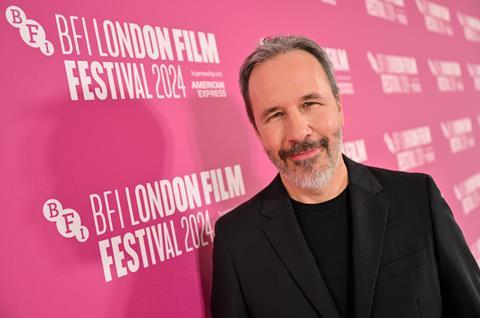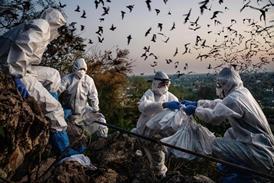
Denis Villeneuve says he hopes to make a dialogue-free feature film, that focuses on “the power of images.”
Speaking at a BFI London Film Festival Screen Talk hosted by Brett Goldstein, Villeneuve said, “I love dialogue, but not [always] in cinema”, adding that it was sometimes better suited to theatre or television. “I hope one day I will be able to make a film that will not use spoken language,” added Villeneuve. “I try as much as possible to use the power of images.”
The topic of silence and listening came up several times during the 75-minute session, which picked up on all 11 feature films to date from the Canadian director. After a clip of the climactic scene near the end of 2024’s Dune: Part Two, Villeneuve said, “Zendaya gave an incredible performance, where she has mostly no dialogue but just the reactions – and we understand the tragedy.”
That scene features most of the key characters in the film, including Zendaya’s Chani and Timothee Chalamet’s Paul Atreides. “Worm riding, big special effects are one thing; but that for me was challenging,” said Villeneuve. “I had 12, 15 big actors in one room, each [of whom] could lead their own film, and all those extras. To sustain the atmosphere and the specific energy I was looking for – that was a nice challenge.”
The talk was briefly interrupted on a couple of occasions by the sounds of a baby in the audience, including during Villeneuve’s response to a question from Goldstein about “stillness and silence.”
“I love babies!” smiled Villeneuve after one such interruption. “I love when kids are coming on set.”
Villeneuve also detailed how writer Eric Roth was the first to put “fingers to the keyboard” on the Dune remake script. Roth asked Villeneuve for “one word that was a key to open the book,” to which the director responded “women,” telling Roth, “we have to make an adaptation that focuses on the Bene Gesserit [a quasi-religious sisterhood in the Dune story].
Focusing on the female characters allowed Villeneuve to come closer to Frank Herbert’s novel, the director said. “The character of Chani became more prominent [in his adaptation],” said Villeneuve. “That gave us distance from Paul Atreides, to get closer to Frank Herbert’s idea of a cautionary tale.”
Favourite film
Villeneuve also discussed his 2017 blockbuster Blade Runner 2049, which he took on due to Ridley Scott’s 1982 original being among his top films. “To make a sequel to my favourite film is a beautiful way to end my career,” quipped Villeneuve, who also gave details on the secrecy that was required when Scott asked him to read the project, including Villeneuve having to find the most secluded meeting place he could in Mexico while shooting Sicario.
“You know Ridley, he’s the most prolific, over-busy director,” said Villeneuve of why Scott chose not to make the sequel himself. “When I do one movie, he does three. Also, I think Harrison Ford was tired of waiting.”
Having moved from his smaller-scale early films such as Maelstrom and Polytechnique, to major blockbusters, Villeneuve identified stamina as the biggest challenge of the latter.
“World-building is very demanding – you have to create everything,” said Villeneuve. “Those movies, the most difficult thing is stamina. Sicario was 35, 40 days [shoot]; Dune, it’s 120.
“The toughest thing in all the movies I’ve made is there’s always a morning where I’m bad. It’s like trying to play an instrument and you’re out of tune. Cinema is an act of presence, I have to be 100% there. That is the worst day of my life.
“But I’ve learned that you can always reshoot,” added the director, to laughter from the LFF audience.
The BFI London Film Festival Screen Talk programme continues today with talks from Anora director Sean Baker and Emilia Perez star Zoe Saldana. LFF runs until Sunday, October 20.

























No comments yet